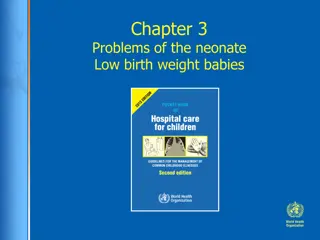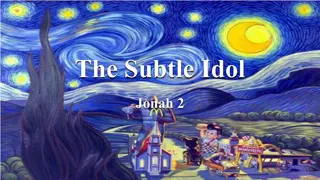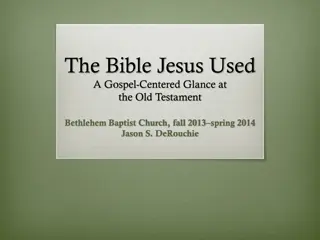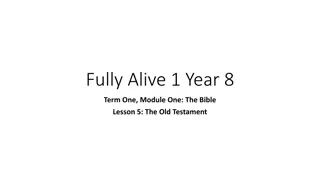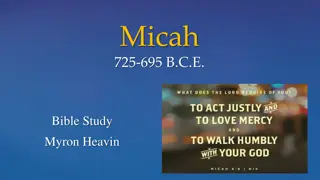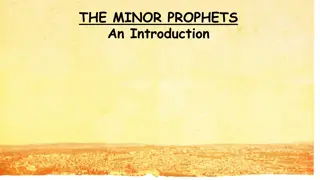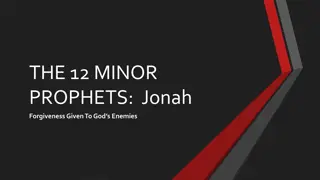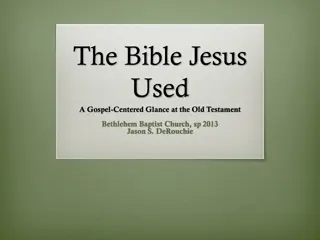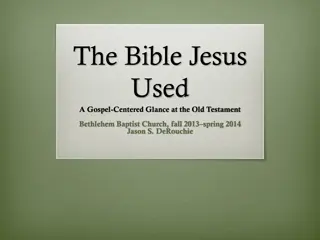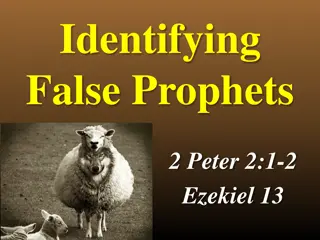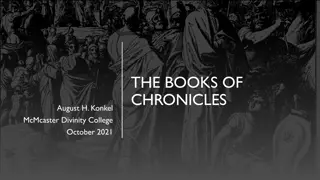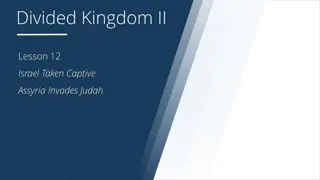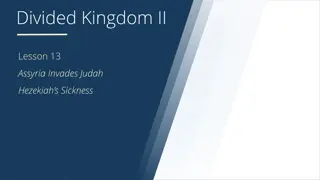Jonah, Micah, and Nahum: Prophets of Judah and Israel
Prophets Jonah, Micah, and Nahum were significant figures in the biblical history of Judah and Israel. Jonah was called to Nineveh, Micah highlighted sins in Samaria and Jerusalem, while Nahum prophesied the fall of Nineveh and Assyria. Each prophet's message carried themes of judgment, forgiveness, and God's compassion. Their prophetic activities spanned different periods, addressing socio-political issues, idolatry, and leadership failures. Studying their texts provides insights into the religious and moral climates of ancient Israel and Judah.
Download Presentation

Please find below an Image/Link to download the presentation.
The content on the website is provided AS IS for your information and personal use only. It may not be sold, licensed, or shared on other websites without obtaining consent from the author.If you encounter any issues during the download, it is possible that the publisher has removed the file from their server.
You are allowed to download the files provided on this website for personal or commercial use, subject to the condition that they are used lawfully. All files are the property of their respective owners.
The content on the website is provided AS IS for your information and personal use only. It may not be sold, licensed, or shared on other websites without obtaining consent from the author.
E N D
Presentation Transcript
Jonah Date: Jonah prophesied during the peaceful and prosperous time of Jeroboam II (2 Kings 14:23 28), who ruled in Israel (the northern kingdom) from 782 to 753 B.C. This was a time when Assyria was not a threat to Israel.
Jonah Overview: The Lord called Jonah to go to the great Assyrian city of Nineveh to pronounce judgment on it. Jonah attempted to escape the Lord s calling by sailing from the seaport of Joppa to Tarshish, which was probably on the shores of the western Mediterranean. Eventually he obeyed the Lord and traveled overland to Nineveh.
Jonah Theme: The primary theme in Jonah is that God s compassion is not limited just to us (Jonah and the Israelites) but also available for them (the pagan sailors and the Ninevites).
Jonah Important passages: 1:1-3 1:14-17 2:7-10 3:3 4:1-4
Micah Date: Micah prophesied during the reigns of the Judean kings Jotham (750 735 B.C.), Ahaz (735 715), and Hezekiah (715 687). This was about the same time as Hosea and Isaiah. The length of Micah s public activity may have been about 20 to 25 years.
Micah Overview: Micah writes to bring God s lawsuit against his people (3:8). He indicts Samaria and Jerusalem for their sins (1:2 7). Both Assyria (5:5 6) and Babylon (4:10) stand ready to carry out God s judgment. The reigns of Jotham, Ahaz, and Hezekiah, along with the increasing threat of Assyria, provide the broad background for Micah. Micah lists specific sins of both the northern and southern kingdoms. These sins include idolatry (1:7; 5:12 14); the seizure of property (2:2, 9); the failure of civil leadership (3:1 3, 9 10; 7:3), religious leadership (3:11), and prophetic leadership (3:5 7, 11); offering sacrifice without truly repenting (6:6 7); and corrupt business practices and violence (6:10 12).
Micah Theme: The theme of Micah is judgment and forgiveness. The Lord, the Judge who scatters his people for their sins, is also the Shepherd-King who in covenant faithfulness gathers, protects, and forgives them.
Micah Important passages: 3:1-6 4:1-3 6:6-8 7:5-10
Nahum Date: The prophet Nahum was God s messenger to announce the fall of Nineveh and the complete overthrow of Assyria. Nahum refers to the fall of Thebes as a well-known occurrence (3:8 10). The Assyrian king Ashurbanipal conquered Thebes around 664 B.C. Nahum also predicts the fall of Nineveh, the capital of Assyria, as a future event. Nineveh fell in 612 B.C. The book was composed, therefore, between 664 and 612 B.C.
Nahum Overview: Nahum s book is a sequel to, and a dramatic contrast with, the book of Jonah. Jonah s mission to Nineveh was probably sometime in the first half of the eighth century B.C. (700s). To Jonah s dismay, the Ninevites listened to his message, repented, and were spared God s judgment. This repentance, however, did not last beyond 745 B.C., when Nineveh became the leading military power in the Near East. In 722 B.C. the Assyrians conquered the northern kingdom of Israel. Nineveh was destroyed in 612 B.C., marking the end of the Assyrian empire.
Nahum Theme: Nineveh, the arrogant capital of the Assyrian Empire, will be destroyed.
Nahum Important passages: 1:2-3 1:7 3:19
Habakkuk Date: Habakkuk is unusual as a prophetic book. It never addresses the people of Judah directly. Rather it is a dialogue between the prophet and God. The prophet Habakkuk was probably a contemporary of Zephaniah and Jeremiah, and possibly even of Ezekiel and Daniel. He probably prophesied no later than the end of Josiah s reign (640 609 B.C.).
Habakkuk Overview: The first two chapters are organized around Habakkuk s questions and the Lord s replies. Habakkuk saw Judah s rapid moral and spiritual decline, and this deeply troubled him. Yet God s response puzzled him even more. How could a good and just God use a more wicked nation (Babylon) to punish a less wicked one (Judah)? God makes it clear that both nations are to be judged and punished for their sin. Habakkuk has learned to rely totally on God s wisdom and justice. He knows God can resolve issues in ways he could never have imagined. This God is worthy of Habakkuk s praise and worship.
Habakkuk Theme: God is just and merciful, even though his people may not always understand his ways (2:4). Wickedness will eventually be punished, and the righteous will ultimately see God s justice (2:5 20). God uses some wicked nations to punish other wicked nations, but ultimately God will judge all nations (1:6; 2:5 20).
Habakkuk Important passages: 1:2-4 2:4 3:17-19




